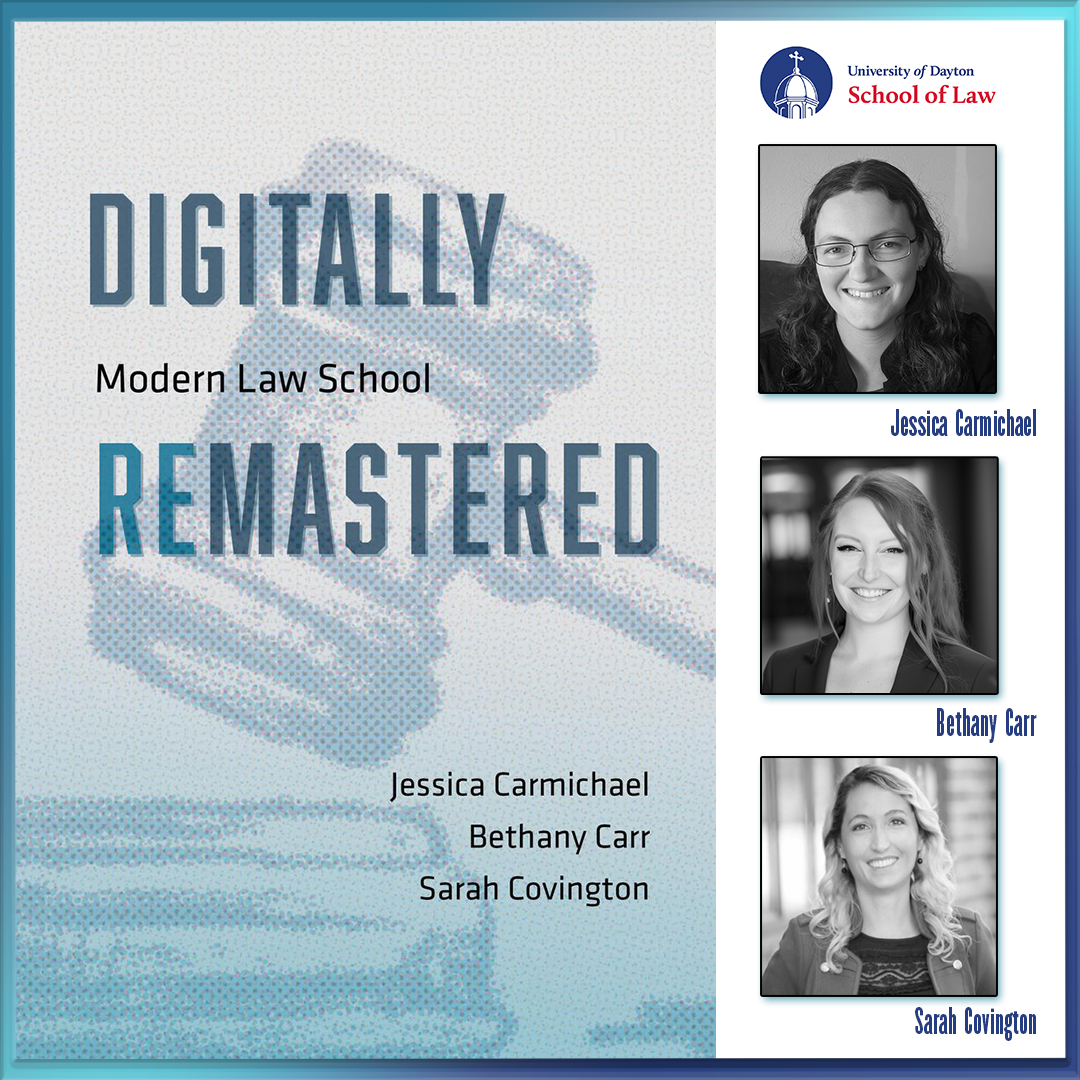Dayton Docket

Students Write The Book On How To Navigate Online Law Courses
To write the book on what to expect as an online law student, you have to start somewhere.
As with any written work, you could start with a single letter.
For Jessica Carmichael, Bethany Carr and Sarah Covington that letter was “C.”
You could also start with the creation of online law classes themselves.
The University of Dayton School of Law was one of the first four schools in the country to offer an Online Hybrid J.D. approved by the American Bar Association.
Or you could even go further back and start with the various guides that have existed for decades that try to prepare students for what their first year of law school will be like.
All those beginnings have led Carmichael, Carr and Covington to where they are now. They’re authors, whose book, “Digitally Remastered: Modern Law School” has been published by Carolina Academic Press and made available for new online law students to use as a guide.
“This is the resource I needed that I wish I had,” says Covington in describing her own first year online law school experiences.
Carmichael, Carr and Covington each had their own reasons for starting the University of Dayton’s Online Hybrid J.D. program.
For Carmichael, who lives in the western part of South Dakota, it was much easier than trying to move closer to a law school.
Carr wanted to be able to continue her career in higher education, while she gained the knowledge to one day be a general counsel in that field.
Covington, who was the chief operating officer of a health tech startup, was looking at Ph.D. programs and discovered that an online J.D. would be a better route to go for her.
But what brought them together in their online law classes were their names, and the way professors used the alphabet to divide students into groups for various assignments.
“I was fortunate to have a similar last name to my counterparts,” Covington says. “That’s how we got to know each other was simply because of the alpha splits at UDSL. Who knew they’d be so valuable for all of us?”
The three quickly discovered they worked really well together.
“A lot of times people think of online as not having as much community, but we were able to find that community early on,” Carr says.
But what they couldn’t find as easily was guidance from upper level students.
“It became obvious as we progressed through the first year and a half there were certain experiences as an online student we weren’t getting the same way,” Carmichael says. “There were different processes and terms that we as a group aren’t as familiar with because it’s not being handed down from the 2Ls and 3Ls you see every day.”
And the books designed to help law students through their first year didn’t always translate to the online law experience.
“They had great suggestions like go do study group in the library and get involved in the things on campus and I’m like that’s great but I need to know how to make this work for my life,” Covington says. “Also, they seemed like they were written by people who law school came easy to them, but it was a struggle for me.”
So the three began talking about possibly writing their own guide for first year online law students.
“We started with an idea, met a couple times and it went from there,” Carr says.
The trio approached the book in a similar way to how they approached their class work. They started by putting various topics in a shared document and then got to work writing, with each one focusing on the areas in which they were strongest and also the areas in which they were weakest.
“That way we had both sides of the coin for every chapter,” Carr says.
The book is designed so that it can be assigned by a professor for first year online law students.
“It’s drafted with weekly reading that’s tailored to what a first semester law student will need at each point in the semester,” Covington says.
The book also includes a QR code that will allow students to join a LinkedIn group created for those in online law programs.
“We want students to have people they can connect with and build community with because it can be isolating to go through an online program if you don’t have those pathways built,” Covington says.
The three hope the book will help others find their own starting places in their online law classes.
“People are a little hesitant,” Carr says. “It’s new. Law isn’t always accepting of change. It takes a while. But that doesn’t mean it’s bad. Different can sometimes be very good.”
Adds Carmichael, “Don’t fall for the inevitable impostor syndrome. You’re going to feel like you can’t do it, but you can. It takes adjustment and flexibility. We tried to make the book so it can smooth that transition.”
Assistant Dean of the Online Hybrid J.D. Program, Victoria VanZandt, who’s seen firsthand in classes how the three have adapted to learning the law online, believes their book will provide a great example for future students to follow.
"These three women are truly pioneers in the field of online legal education,” Assistant Dean VanZandt says. “Their insights, advice, and practical experience from a student's perspective will help pave the way for those following in their footsteps."
